Index relies entirely on the support of donors and readers to do its work.
Help us keep amplifying censored voices today.
 |

|
GreatFire was set up in 2011 by three anonymous individuals to counter the “Great Firewall of China”, the systematic blocking by the Chinese government of any website deemed controversial, including any that touch on news, human rights, democracy or religion.
“We know them as a mix of folks within China and outside of China who have a mix of activism and technological expertise,” said Dan Meredith of the Open Tech Fund, one of GreatFire’s financial backers.
“Their motivations are not regime change, but purely wanting to see progress for the Chinese people, and see more reforms happen in the Chinese government. They’re passion driven, but they also have this insider knowledge about how to circumvent some of these really sophisticated things that are happening in China,” he told Index.
“GreatFire is quite a mysterious organisation,” Jimmy Wales, founder of Wikipedia told Index. “It’s, roughly speaking, five people, maybe it’s not quite five, maybe its more,” he said. “But it really is just a small group of people who have come together to do something important.”
The team started out collecting data about which sites were blocked in China, and now monitors over thousands of sites, domains and Google searches. “They have a network of computers in and outside of China, testing for whether websites that are generally available to the public here in the UK or the US or any other country that has unrestricted access to the whole internet, are available within China,” Meredith explains. Their site also shows how much of the time it has been blocked, and offers an explanation as to how.
GreatFire are also the makers of FreeWeibo, which was a shortlisted in 2015’s Index Awards and acts as a mirror to Weibo, the popular, but heavily censored, Chinese social network. As well as this they also run FreeBooks, allowing people in China read censored books.
“GreatFire are one of the organisations that are really fighting hard against censorship in China,” said Wales.
But last year GreatFire’s work went from being an annoyance to the Chinese authorities, to being something they couldn’t ignore, Meredith explained.
Using an idea called collateral freedom, GreatFire made blocked sites accessible to millions in China and around the world. The collateral freedom idea works by pinning banned websites to those of big corporations (such as Amazon, Microsoft or GitHub) which, in order to compete in the global marketplace, China cannot block. When organisations normally blocked in China – like the BBC or Reuters – use, for example, amazon.com as a host their sites can remain visible in China.
In February 2015, GreatFire used this technology to release an Android app, allowing anyone in China, or in other countries where the web is censored, to access these otherwise censored sites. Everything they do is open source, so their work can be replicated by others.
However, it was GreatFire’s work with Reporters Without Borders, Meredith says, that finally caused the Chinese government to retaliate.
“We know is that they are incredibly frustrated by this collateral freedom idea,” he said. “But what happened last year when Reporters Without Borders started employing this is…there became a very big press strategy, so what ended up being a thing that was quietly annoying the Chinese became a very public thing that was annoying the Chinese.”
The project was launched on World Press Freedom Day in March 2015, and used collateral freedom to unblock websites around the world, making previously censored sites available in Russia, Iran, Vietnam, Cuba and Saudi Arabia. The unblocked websites included Reuters Chinese, BBC on China and German broadcaster Deutsche Welle.
The response from the Chinese government, which became known as the “Great Cannon”, was a critical test for the idea of collateral freedom, says Meredith.
“They took all the Chinese traffic that was trying to come in, and put a mirror on it – so this is one billion people, a third of the internet – and instead of directing that to an internal website, they redirected all that traffic to GitHub, to Amazon, to Microsoft,” said Meredith. By directing this traffic to all the sites used by collateral freedom, the Chinese government were testing those service providers.
“It was just enough to raise all the flags and create a very public storm which created a further media event that said ‘China is blocking Amazon or blocking GitHub’ – at which point they stopped.”
The point of this, Meredith explains, is that the economic cost of blocking the big providers, this time, outweighed the Chinese government’s desire to censor the web. So if in the future, during a major election for example, the government might be tempted to block these sites. GreatFire showed the Chinese government, and the world, what it would cost.
“What it shows is possible is something GreatFire can really lay claim to. They showed that China could do this, would try to do it, that those companies could weather that storm, and that the balance is still there where millions of people are able to get online because of collateral freedom.”
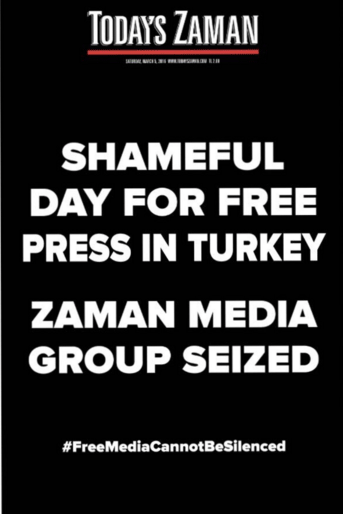
This column was originally submitted to Today’s Zaman but was rejected by the new management. Yaşar Yakış is a Turkish politician. He is a former foreign minister, and a former ambassador to the UN Office in Vienna, Egypt and Saudi Arabia, and was a columnist for Today’s Zaman.
An important step has been taken in Turkey’s painful negotiations with the EU. Turkey submitted to the Turkey-EU summit, held in Brussels on 7 March, several proposals, including the following:
-Move to 1 June 2016 the implementation of the readmission agreement, which will make Turkey contractually obligated to readmit any person who travelled to an EU country from Turkey if he or she was not admitted by that EU country;
-For every citizen of a third country readmitted by Turkey, the EU should promise that it will admit one refugee from Turkey, and the readmission expenses will be covered by the EU. This will protect Greece from the uncontrollable flow of refugees arriving in the Greek islands from Turkey’s coastal towns. However, difficulties may arise in finding an EU country that will fulfill this commitment, and Turkey’s refugee problem may continue to increase since the arrival of refugees from Syria may not stop before Syria is stabilised.
-If the readmission agreement enters into force by 1 June 2016, visa-free travel will be possible for Turkish citizens wishing to visit the Schengen countries.
-Turkey asked for an additional 3 billion euros, to be spent for refugee-related projects.
-Turkey’s EU accession process will be reactivated by opening new negotiation chapters that were blocked for political reasons, either by the EU Council or by individual countries, such as France and the Greek Cypriot administration. This positive commitment may not guarantee that Turkey will become a member of the EU but may lead to the resumption of the reforms that Turkey has to comply with under the Copenhagen criteria and the Maastricht economic criteria.
The deal will be discussed once again with Turkey before the EU Council meeting on 18 March.
Turkey’s refugee problem may thus be slightly alleviated if the genuine efforts by Chancellor Angela Merkel of Germany succeed. The bulk of the burden, however, will still remain on Turkey’s shoulders. Turkey will have to accommodate the refugees, mainly from Syria, until the EU countries select among them the eligible ones. The EU does not want to assume the moral responsibility for the solution of a problem that stems basically from Turkey’s open door policy for Syrian refugees.
The good side of the deal for Turkey is that the EU is giving Turkey a helping hand. If Chancellor Merkel hadn’t taken the lead to alleviate Turkey’s refugee burden, Turkey would have been left alone to solve it. If the deal is implemented properly, Turkey will receive not only an easing of its refugee burden but will make progress in other areas: One of them is the grinding to a halt of Turkey’s EU accession process. Both Turkey and the EU had lost their appetite for the continuation of the process. Not only the refugee problem but also the entire Syrian crisis, and beyond it the other crises in various Middle Eastern countries, may have demonstrated to certain EU countries that cooperation with Turkey could facilitate the solution of the problems that the EU may face in the Middle East. Therefore, certain EU countries may have decided to revisit the question of the reactivation of Turkey’s EU accession process.
Add your support to Index on Censorship’s petition to end Turkey’s crackdown on media freedom.

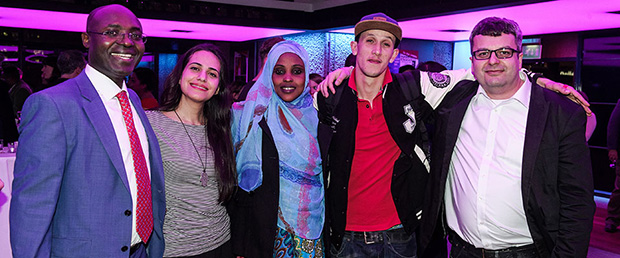
Rafael Marques de Morais, Safa Al Ahmad, Amran Abdundi, Mouad “El Haqed” Belghouat and Tamas Bodokuy (Photo: Alex Brenner for Index on Censorship)
When times get tough, freedom of expression can quickly fall down the list of priorities. But it is exactly in these circumstances when the ability to communicate and express yourself is most important. For this reason, we continue to draw inspiration from last year’s Index on Censorship Freedom of Expression Awards fellows and their struggles to keep freedom of expression alive and well.
As we look forward to the 2016 Index awards, here is our latest reminder of just how important a job our past winners do in the fight for free speech.
Tamas Bodoky, Atlatszo.hu / Digital Activism
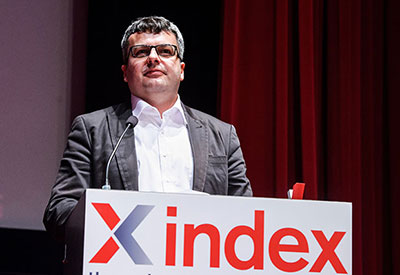
Last year was a positive one for the Hungarian investigative journalism site and NGO Atlatszo. The site’s yearly report reveals that funding was on the up and readership remained high.
The report also outlines the site’s main investigations over the course of 2015, which include exposing state corruption, public budget spending, irregularity within EU funding and land lease and privatisation controversies.
The website’s project for tracking down hate crime gained traction in 2014, and last year expanded to include “violent football hooligan groups and clergymen, who are close to the far-right,” the site’s executive director Tamas Bodoky told Index on Censorship.
“Unfortunately, some people became very hostile to our refugee crisis reporting last year, saying things like ‘go to hell, Atlatszo, for helping them’,” he added.
Atlatszo made 90 freedom of information requests as an organisation — plus hundreds of requests submitted by staff in their own names. Around 50% of Atlatszo’s requests were at least partially granted. Of those that weren’t, the site has initiated court proceedings to obtain the information, with almost half so far being successful, with several others pending.
Going forward, Atlatszo has plans to expand by working with more bloggers and developing a new website allowing Hungarian citizens to “question representatives of Hungary in EU, members of the Hungarian Parliament and — in the long run — representatives of the local governments”. The kepviselom.hu (my representative) project is currently seeking donors through crowdfunding.
“The Index award certainly helped get more international recognition over the last year,” Bodoky said. “As a very small news organisation, we constantly struggle for visibility, and Index on Censorship was instrumental in raising the visibility of our cause.”
Safa Al Ahmad / Journalism
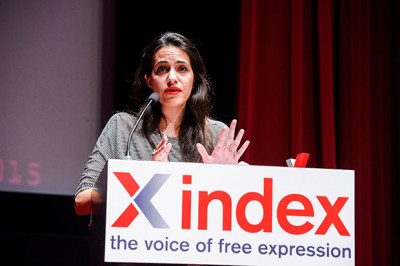 With the political crisis in Yemen steadily getting worse since last year, any plans Safa Al Ahmed had to switch focus were sidelined as she returned to the battle-scarred country.
With the political crisis in Yemen steadily getting worse since last year, any plans Safa Al Ahmed had to switch focus were sidelined as she returned to the battle-scarred country.
“I filmed events in Aden and then Taiz, which is currently besieged,” the award-winning journalist told Index on Censorship. “I’m going to be producing two separate films for both cities because north and south have very different dynamics.”
Actually getting into Yemen is a real task in itself. Al Ahmed and her crew took a boat from Djibouti to Aden, which took 34 hours, and then travelled for another day off-road and across mountainous terrain, passing snipers along the way.
With the execution of the prominent Shia cleric Nimr al-Nimr, Al Ahmad’s own country Saudi Arabia was briefly catapulted back into international focus at the start of 2016, but it didn’t last. “There is very little investigative journalism being done on the ground, which makes reporting difficult as there isn’t very much to build on,” Al Ahmed says.
Citing the flogging of blogger Raif Badawi as an example of how brutal the Saudi regime is of critical voices, Al Ahmad describes the state of free speech in Saudi Arabia as “frightening”. “The government have passed really wide rulings and laws so they can stop or arrest anyone for the simplest of reasons, including talking about the war in Yemen, which has been banned,” she explains.
The big difference between now and 2014 is that people are currently receiving death sentences, which is “a whole different level of intimidation”.
Mouad Belghouat aka El Haqed / Arts
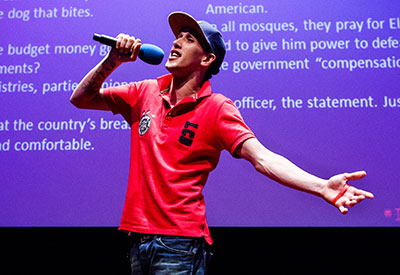 Last time we caught up with Moroccan rapper Mouad Belghouat, aka El Haqed, in October, he was in his home country keeping a low profile, while looking forward to performances in Florence, Italy, and at the 25th anniversary of the Moroccan Association of Human Rights in Brussels. Since November 2015, he has been living in Belgium, having applied for refugee status.
Last time we caught up with Moroccan rapper Mouad Belghouat, aka El Haqed, in October, he was in his home country keeping a low profile, while looking forward to performances in Florence, Italy, and at the 25th anniversary of the Moroccan Association of Human Rights in Brussels. Since November 2015, he has been living in Belgium, having applied for refugee status.
“In Morocco I felt threatened and under constant control,” he told Index this month. “It’s been hard, because already I miss the place where I grew up; I miss my family and my friends.” The situation in Morocco “deteriorates more and more every day, at all levels”, he explains, but vows one day to return.
He has now been cleared to work in Belgium, and has also turned his attention to creating more music. “I’m trying to finish the album I’ve been writing based on my experiences in prison in Morocco, and — as the last set of concerts have gone so well — I will be performing in Belgium in March and am looking to tour Norway come April.”
There are also plans for a biography based on his experiences from 2011, when his music became an anthem for many Moroccans involved in the Arab Spring, right up to his persecution at the hands of the authorities, right up to his eventual self-imposed exile.
As for the Index award, he said: “Through Index, I met many great people from all over the world who share the same principles as me, and word of my case has spanned the breadth of the world.”
Amran Abdundi / Campaigning
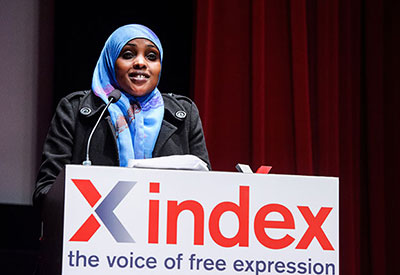 During our last conversation with Amran Abdundi, we discussed the attack in her native Kenya by Al-Shabaab linked terrorists on Garissa University College, in which 148 people were murdered. Abdundi, who knows many students from the college, immediately joined with other women leaders to organise strong community protests against Al-Shabaab.
During our last conversation with Amran Abdundi, we discussed the attack in her native Kenya by Al-Shabaab linked terrorists on Garissa University College, in which 148 people were murdered. Abdundi, who knows many students from the college, immediately joined with other women leaders to organise strong community protests against Al-Shabaab.
Last month, Abdundi attended the re-opening ceremony for Garissa University College. “I was happy to meet victims who I offered counselling to after the attack, and see them now back on their feet, ready to study and achieve their dreams,” she told Index.
She has also been busy recently with the upcoming launch of the new Frontier Indigenous Network website and implementing a new social media strategy to foster better connections between Kenyan women and the rest of the world.
As part of this new development plan, 2016 is packed with new projects, including an education programme on non-violence to counter violent extremism and radicalisation. The project will bring together Christians and Muslims together in “preaching peace and reconciliation”.
“All of this wouldn’t have been possible without the Index award and the support I have received from Index on Censorship, which led me to meet key individuals, such as Kenya’s woman minister, Anne Waigiru.”
Rafael Marques de Morais / Journalism
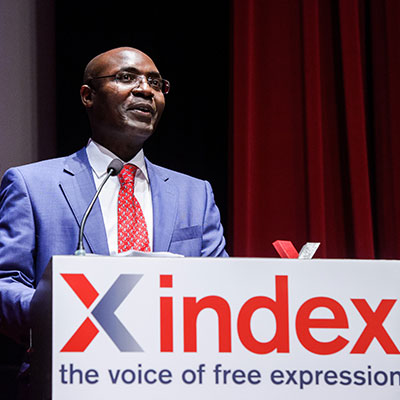 President José Eduardo dos Santos has been in power in Angola for over 35 years and his regime faces criticism on many fronts for, among other things, land grabbing, human rights abuses in Angolan prisons and the divvying up of the country’s resources to his family “like it was their inheritance”. These are just some of the issues Index award winner Rafael Marques de Morais is focusing on his activism and writing.
President José Eduardo dos Santos has been in power in Angola for over 35 years and his regime faces criticism on many fronts for, among other things, land grabbing, human rights abuses in Angolan prisons and the divvying up of the country’s resources to his family “like it was their inheritance”. These are just some of the issues Index award winner Rafael Marques de Morais is focusing on his activism and writing.
“This kind of work generates all sorts of troubles, because when you speak out against the president, you become suspect,” de Morais told Index on Censorship.
Being a high-profile activist within the country, there is a misconception that de Morais doesn’t feel the full force of the regime. “I might be ‘free’ but I can’t go anywhere; when I went for a drink recently the person I was with noticed we were being watched,” he explains. When he tried to enter a courtroom in December to observe the case involving the 15 Angolan bloggers now under house arrest, he was denied access. “Immediately the news on television was that I tried to enter the court illegally, because being high profile, the main thing they can attack is your reputation.”
Coupled with the ongoing economic crisis in Angola preventing citizens from taking money out of the bank, times are tough. “How is one supposed to survive and keep going?” he asks.
But go on he does. The attention from home and abroad, including that generated by the Index award, have provided some solace. “It’s always refreshing to know that people are interested,” he explains. “The award provides great encouragement for one to keep going.”
“But that’s it. The next day, you are back to struggling for survival.”
The Index on Censorship 2016 Freedom of Expression Awards shortlist has been announced.
His Majesty Sheikh Hamad bin Issa Al Khalifa,
King of Bahrain
Fax: +973 176 64 587
CC: His Excellency Lieutenant General Rashid bin Abdullah Al Khalifa
Minister of Interior
Email: [email protected]
His Excellency Sheikh Khaled Bin Ahmad Al Khalifa
Minister of Foreign Affairs
Fax: 00973 17 21 05 75; [email protected]
And Permanent Mission of Bahrain to the United Nations in Geneva
Fax: + 41 22 758 96 50; Email: [email protected]
21 January 2016
Your Majesty,
We, the undersigned NGOs, call on the Bahraini authorities to lift the arbitrary travel ban on human rights defender Nabeel Rajab in order that he be able to travel abroad with his family for the purpose of securing medical assistance for his wife, Sumaya Rajab.
Nabeel Rajab is President of the Bahrain Centre for Human Rights, Founding Director of the Gulf Centre for Human Rights, Deputy Secretary General of the International Federation for Human Rights and on the Advisory Committee of Human Rights Watch’s Middle East Division.
A public prosecutor imposed the travel ban on Nabeel Rajab without any judicial determination on July 13 2015, the day that Your Majesty pardoned him and ordered his release following his conviction for “publicly insulting official institutions” by criticizing the government on social media. The travel ban is related to two other speech-related charges that led to his arrest on April 2 2015, charges which prosecutors have not dropped.
The first outstanding charge is for allegedly “insulting a statutory body”, under article 216 of Bahrain’s Penal Code, based on his social media comments about the alleged torture of detainees in Jaw Prison in March 2015. The second accuses him of “disseminating false rumours in times of war,” under article 133 of the Penal Code, based on social media posts criticizing Saudi Arabia-led coalition air strikes in Yemen. Violations of articles 133 and 216 carry maximum sentences of 10 and three years in prison, respectively. Neither of the alleged acts upon which these charges are based were in any way recognisable criminal offences under international human rights law, and both involved the peaceful exercise of internationally protected rights to freedom of expression and to promote and protect human rights.
In November 2015, Sumaya Rajab was diagnosed with medical conditions requiring urgent and highly specialized treatment according to the medical expert team monitoring her condition. She was told that this treatment is not available in Bahrain.
In December 2015, Nabeel Rajab’s lawyers submitted their fourth appeal against the travel ban – they have submitted two requests to the attorney general, one request to the investigating prosecutor and one request to the Public Prosecution Office – requesting that it be lifted so he could accompany his wife. The Bahraini authorities have not responded to these appeals and the travel ban remains in place.
In November 2015, 81 Members of the European Parliament called on Your Majesty to lift Nabeel Rajab’s travel ban. The European Parliament passed a resolution in July 2015, shortly prior to Nabeel Rajab’s pardon, calling for his immediate and unconditional release alongside other prisoners of conscience. The same month, 44 members of the UK Parliament called on the government of Bahrain to drop Nabeel Rajab’s current charges and to release all political prisoners and those imprisoned for exercising their right to freedom of expression. After his release, three UN human rights experts – Michael Forst, David Kaye, and Maina Kiai – called for Nabeel Rajab’s charges to be dropped. This followed the UN High Commissioner for Human Rights, Prince Zeid Ra’ad Zeid Al-Hussein, call for the release of all those detained in relation to their peaceful activities in Bahrain in June.
We, the undersigned, therefore call on the Bahraini authorities to:
Signatories:
Americans for Democracy and Human Rights in Bahrain (ADHRB)
Amnesty International
Arabic Network for Human Rights Information (ANHRI)
Bahrain Institute for Rights and Democracy (BIRD)
Bahrain Center for Human Rights (BCHR)
Cairo Institute for Human Rights Studies (CIHRS)
Canadian Journalists for Free Expression (CJFE)
CIVICUS
English PEN
European Centre for Democracy and Human Rights (ECDHR)
FIDH, within the framework of the Observatory for the Protection of Human Rights Defenders
Freedom House
Front Line Defenders
Gulf Centre for Human Rights (GCHR)
Human Rights Watch
Index on Censorship
International Media Support (IMS)
International Service For Human Rights (ISHR)
Lawyer’s Rights Watch Canada (LWRC)
Maharat Foundation
No Peace Without Justice
PEN International
Physicians for Human Rights
Rafto Foundation for Human Rights
Salam for Democracy and Human Rights
SENTINEL Human Rights Defenders
World Organisation Against Torture (OMCT), within the framework of the Observatory for the Protection of Human Rights Defenders